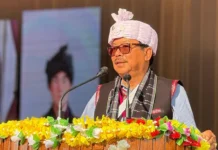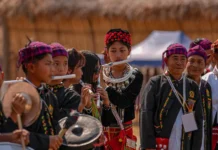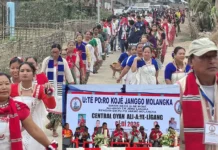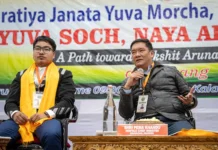[ Bamang Losik ]
The diverse indigenous cultures of Arunachal Pradesh are home to a variety of unique traditions, beliefs, and practices. Among them, the Doni Polo religion holds a special place as the traditional faith of the Tani tribes, including the Nyishi, Apatani, Adi, Tagin, and Galo. However, in recent years, growing misconceptions have blurred its identity, with some mistakenly associating it with Hinduism, Christianity, or other global religions. This has raised concerns among indigenous communities about the need to preserve Doni Polo in its purest form and ensure its recognition as an independent faith.
Understanding Doni Polo
The term Doni Polo originates from the words ‘Doni’(the sun) and ‘Polo’ (the moon), symbolising truth, wisdom, and universal balance. Unlike organised religions with structured doctrines and sacred scriptures, Doni Polo is a nature-worshipping belief system passed down through oral traditions, folklore, and rituals.
Key aspects of Doni Polo include:
- Animism and nature worship – Followers believe in the spiritual essence of natural elements such as the sun, moon, rivers, forests, and mountains. Rituals are conducted to honour these forces and seek blessings for wellbeing and prosperity.
- Oral traditions and folklores – Unlike scriptural religions, Doni Polo teachings are preserved through chants, myths, and folktales shared across generations.
- Shamanism and rituals – Shamans, known as nyubu, miri, or neyi, act as spiritual guides, conducting ceremonies, healing rituals, and mediating between the human and spiritual worlds.
- Community-centred practices – Doni Polo is deeply integrated into the tribal way of life, with festivals like Solung, Nyokum, Dree, and Si-Donyi serving as cultural expressions of faith and harmony with nature.
Preserving the unique identity of Doni Polo
Despite its deep-rooted traditions, Doni Polo faces challenges from external religious influences, leading to confusion about its identity. Some mistakenly categorise it alongside Hinduism or Christianity, despite fundamental differences:
- Absence of centralised religious texts – While Hinduism has the Vedas and
Christianity follows the Bible, Doni Polo relies solely on oral traditions and communal practices.
- Distinct rituals and beliefs – Unlike structured religious doctrines and institutionalised worship, Doni Polo practices animism, where natural forces and ancestral spirits are revered.
- Indigenous identity – Doni Polo is an ethnic faith deeply tied to the land, customs, and lifestyles of Arunachal’s tribal communities. Unlike major world religions with global followings, Doni Polo remains a distinct cultural and spiritual heritage.
Steps to protect and promote Doni Polo
As modernisation and religious influences grow, the survival of Doni Polo depends on conscious efforts to preserve and promote its traditions:
- Revitalising traditional practices – Indigenous communities must actively transmit folksongs, myths, and rituals to younger generations.
- Recognition of Doni Polo prayer halls (gangging) – Establishing ganggings (Doni Polo prayer halls) can help preserve rituals and provide a space for cultural learning. Ganggings should be established in every district and circle headquarters to ensure wider awareness and accessibility.
The first gangging was established in 1993, but a permanent structure had not been constructed. For the first time, on 19 March, 2023, Arunachal Pradesh State Biodiversity Board Chairman Tayek Goi inaugurated the permanent Doni Polo gangging (place of worship) in Jomlo Bari village in Siang district, in the presence of state BJP vice president Tarh Tarak, district in-charge Ido Loya, and other dignitaries, according to a state BJP release. Despite this development, many people are still unaware of ganggings, and efforts should be intensified to promote awareness and establish more such prayer halls across the state.
- Raising awareness – Schools, media, and cultural organisations must play an active role in educating people about Doni Polo’s distinct identity to prevent it from being overshadowed or misrepresented.
Conclusion
Doni Polo is more than a religion; it is a cultural and spiritual legacy that defines the indigenous identity of Arunachal. While respecting all faiths, it is essential to recognise Doni Polo as an independent belief system, distinct from Hinduism, Christianity, or any other religion. By fostering awareness and ensuring its preservation, we can safeguard this sacred indigenous faith for future generations. (The views expressed are personal.)




